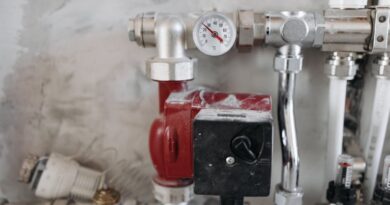Preparing Your HVAC for Seasonal Changes
Did you know that regular HVAC maintenance can save you up to 30% on energy bills? As seasons shift, your heating and cooling systems need a little extra care to stay efficient. Heres how to prepare your HVAC for seasonal changes and ensure a comfortable home all year round.
Why Should You Prepare Your HVAC?

Preparing your HVAC system is like tuning up your car. If you don’t, you risk breakdowns when you need it most. A well-maintained system works better, lasts longer, and keeps your energy bills in check.
Here are some reasons to prioritize HVAC preparation:
- Energy Efficiency: Regular maintenance helps your system run smoothly.
- Longevity: Keeping your system in shape extends it’s lifespan.
- Air Quality: A clean system provides fresh air, free from dust and allergens.
- Cost Savings: You avoid costly repairs by addressing issues early.
What Should You Do for Seasonal Preparation?

Before the temperatures change, take these steps to get your HVAC system ready:
1. Change Your Filters
Filters trap dust, pollen, and other particles. A dirty filter makes your HVAC work harder, wasting energy. Change your filters every 1-3 months, depending on usage.
Tip: If you have pets, you might need to change filters more often. Consider using HEPA filters for better air quality.
2. Inspect Your Thermostat
Your thermostat is the brain of your HVAC system. Ensure it works accurately. A programmable thermostat can help save energy by adjusting temperatures when you’re not home.
Did You Know? According to the U.S. Department of Energy, adjusting your thermostat by just 7-10 degrees for 8 hours a day can save you 10% on your energy bills!
3. Check Ducts and Vents
Blocked ducts can prevent proper airflow. Make sure vents are clean and clear of furniture or other obstructions. Inspect ducts for leaks and seal them if necessary.
Quick Fix: A simple vacuum can do wonders for your vents.
4. Schedule a Professional Tune-Up
Sometimes, it’s best to call in the pros. A technician can perform a thorough inspection, clean the system, and spot potential issues. This is particularly important before the summer and winter seasons.
Pro Tip: Regular maintenance can extend the life of your HVAC system by 5-10 years!
How Does Seasonal Change Affect Your HVAC?

As the weather changes, your HVAC system faces different challenges. Heres what to expect:
Summer Challenges
During summer, your air conditioner works overtime. High temperatures can strain your system, leading to breakdowns if not prepared. Keep your home insulated to reduce the workload.
Fun Fact: Air conditioning accounts for about 12% of all household energy expenses in the U.S.
Winter Challenges
In winter, furnaces kick into high gear. Cold weather can cause problems like frozen pipes and poor air quality. Make sure your heating system is working well before the chill sets in.
What Are Common HVAC Misconceptions?

Many people hold common misconceptions about HVAC systems. Here are a few:
1. Bigger Is Better
Some think a larger system will cool or heat their home more effectively. However, too big of a system can lead to short cycles, wasting energy and causing wear and tear.
2. You Only Need Maintenance When Theres a Problem
Many wait until something breaks. Regular maintenance can prevent issues before they start. Think of it as an investment, not an expense.
3. Closing Vents Saves Energy
People often think closing vents in unused rooms saves money. In reality, this can cause pressure imbalances and damage your system. it’s best to keep vents open.
How Can You Improve Air Quality in Your Home?
Good air quality is essential for your health. Here are ways to enhance it:
- Use Air Purifiers: They can filter out harmful particles.
- Maintain Humidity: Keep humidity levels between 30-50% to prevent mold growth.
- Ventilate: Open windows when weather allows and use exhaust fans.
Small changes can make a big difference in your air quality.
What Should You Consider When Buying a New HVAC System?
If it’s time for a new system, consider these factors:
- Energy Efficiency Rating: Look for systems with a high SEER (Seasonal Energy Efficiency Ratio) rating.
- Size: Ensure it’s appropriately sized for your home.
- Brand Reputation: Research brands for reliability and customer satisfaction.
- Cost: Factor in both the initial cost and potential savings on energy bills.
Consult with HVAC professionals to find the best option for your needs.
When Should You Call a Professional?
While many tasks can be done on your own, some issues require expert help. Call a professional if you notice:
- Unusual noises or smells
- Inconsistent temperatures in different rooms
- Running costs that suddenly spike
Addressing these issues early can prevent bigger problems down the line.
In Conclusion: Actionable Takeaways
Preparing your HVAC for seasonal changes doesnt have to be overwhelming. Heres a quick recap:
- Change your filters regularly.
- Inspect and program your thermostat.
- Keep ducts and vents clean.
- Schedule a professional tune-up.
Remember, a little preparation goes a long way in keeping your HVAC running smoothly. For more tips on HVAC maintenance, check out Energy.govs maintenance guide for more details. Stay comfortable no matter the weather!



